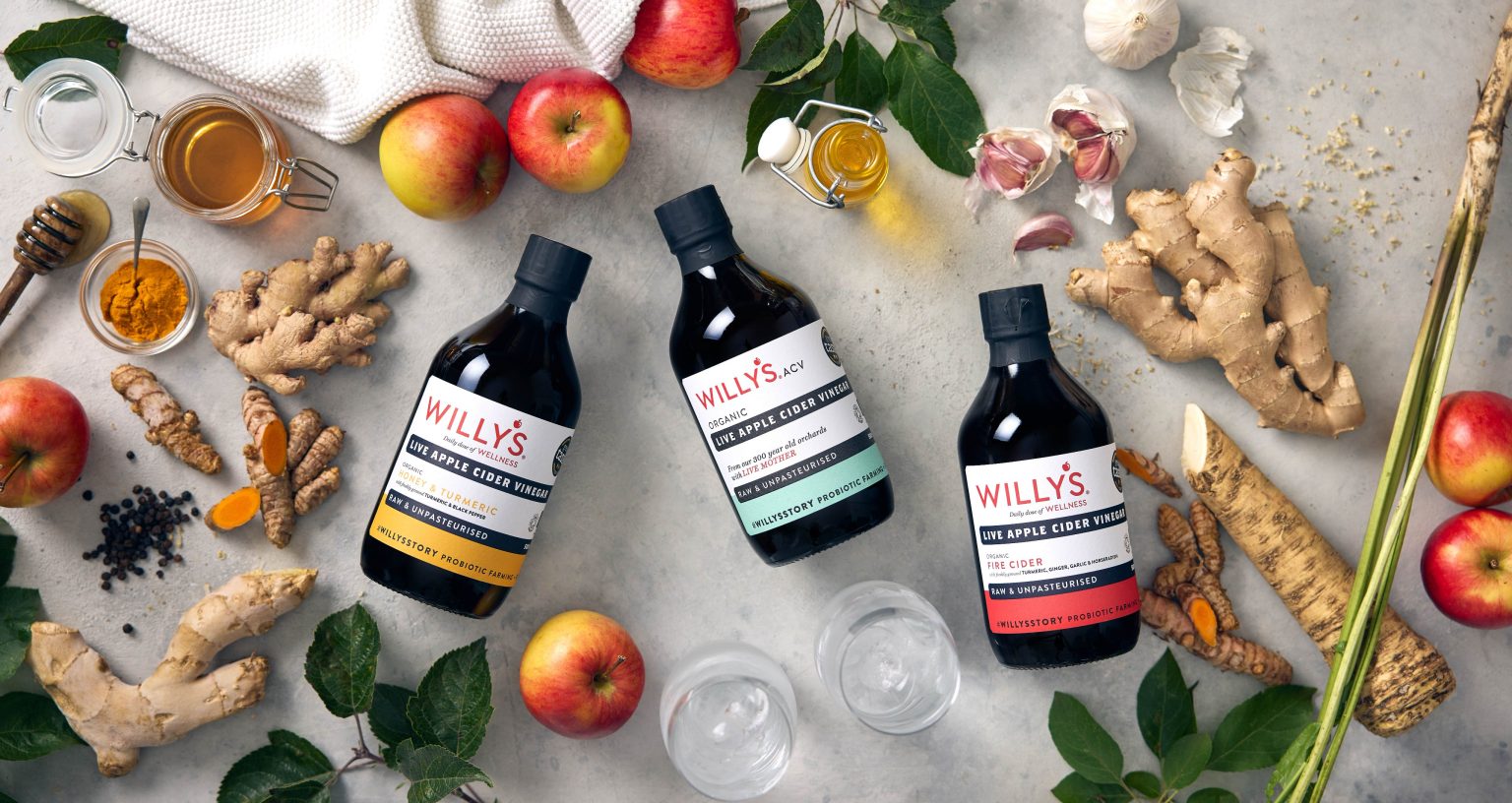Who would have thought that humble apple cider vinegar, that tart kitchen staple, would become the next trendy artisan obsession? But in recent years, a new crop of craft apple cider vinegar makers have started treating the fermented beverage more like a fine wine than distilled white vinegar’s humble country cousin.
The newfound appreciation for high-end apple cider vinegar (or ACV for those in the know) is being driven by several factors converging at once – growing interest in natural health remedies, increased demand for craft and locally-sourced foods, and a trend toward alcohol-free drinking options beyond soda or juice.
Millennials in particular have embraced apple cider vinegar as a healthy, non-alcoholic beverage that can be sipped on its own or mixed into cocktails.
At the forefront of the artisan ACV movement is William Chase, the entrepreneurial force behind Chase Distillery and its successful line of potato-based vodkas and gins. At 63 years old and newly tee-total himself, Chase has turned his passion for quality craft beverages to apple cider vinegar with his latest venture, Willy’s ACV.
“I’ve always been ahead of the trends,” Chase said during an interview at his Herefordshire farm and production facility. “When I started making vodka from potatoes instead of grains back in 2008, everyone thought I was mad. But now potato vodka is actually a recognised category. I think the same is happening now with artisan apple cider vinegar – what seems like a crazy idea today will be normal in a few years.”
Chase stumbled into his newfound obsession with ACV almost by chance. After giving up alcohol, he was drinking apple cider vinegar as part of his new healthy lifestyle that includes daily yoga. But he was dissatisfied with the harsh, industrially-produced vinegars on the market.
“It was indelicate stuff, to be honest,” he said frankly. “The vinegars available had either been pasteurised until all life had been killed off or made using concentrated apple juice instead of fresh-pressed apples. I knew I could make a better, more flavourful product from quality ingredients.”
Chase began experimenting with making small batches of raw, unfiltered apple cider vinegar using fresh-pressed juices from the 300 year old orchard on his Herefordshire farm and following traditional slow fermentation methods. He meticulously sourced specific vinegar “mother” cultures from stock kept by local homebrewers and amateur cider makers to kickstart fermentation. The result was a pleasantly robust yet refreshingly bright and fruity vinegar that quickly gained a cult following locally.
“Our first bottlings would sell out almost immediately,” Chase recalled. “We knew people were seeking something better than what the supermarkets offered. Once the word got out about our product’s quality and provenance, demand just took off from there.”
In 2015, Chase went all-in and launched Willy’s ACV as a national brand carried by retailers like Whole Foods and even trendy restaurants and cocktail bars looking to offer elevated non-alcoholic options. His vinegars, sold in sleek bottles evoking a fine liquor, now come in several varieties beyond the original raw unfiltered version – from a subtly smoky verjus-style cider vinegar made from late-harvest apples to a limited edition aged reserve that has been barrel-aged for a year in repurposed whisky casks.
The depth and range of flavours have helped drive ACV’s transition from basic pantry staple to sophisticated cocktail ingredient and artisan beverage appreciated for its own intrinsic qualities beyond just its health benefits. While the vinegars can still be used for cooking, pickling, or drinking as a daily health tonic, Willy’s has become popular with top mixologists creating non-alcoholic craft cocktails and premium mocktails.
“We’re finally giving apple cider vinegar the respect it deserves,” Chase said. “It has an incredible natural depth of flavour when properly made. Why shouldn’t it be treated with the same artisan care as wine or a fine spirit?”
Of course, Willy’s isn’t the only producer elevating the apple cider vinegar game these days. A number of smaller craft cider vinegar makers have sprouted up in the last five years, often started by homebrewers or farmers seeking to reduce waste by using surplus cider or apple harvests:
Handcrafted in rural Vermont, Nathaniel Reed’s Stycker Cyder Vinegar uses a 200-year old family recipe and New England heirloom apples; their premium barrel-aged Charbonneau style is a revelation.
Oregon’s Reverend Nat pioneered the “ranch tail” – half fresh-pressed apple cider, half raw unfiltered vinegar over ice with a bouquet of dried herbs and fruits.
The husband-and-wife team behind Lineburg Legacy in Pennsylvania established their award-winning fire-barrel vinegar using a historic method of slow smoke-assisted fermentation.
White Rose in Virginia crafts seasonal small-batch apple cider vinegars from foraged heirloom apples picked at their peak of ripeness.
Even large commercial cider makers like Vermont’s Woodchuck, seeing the potential in this growing market, are launching their own premium craft vinegar offshoots. And it’s not just cider companies – established alcohol brands like Samuel Hubbard Wine & Vinegar in Napa Valley recognise the opportunity with new potables like sparkling honey vinegar tonics and vinegar aperitifs.
So whether sipping an aged apple cider vinegar neat, enjoying a vinegar shrub cocktail, or using it to lend depth and richness to favorite recipes, appreciating artisan vinegars in their full glory is becoming a new norm for health-conscious consumers.
If William Chase is right about his trend sense, it’s only the beginning of a full-blown craft vinegar movement in the years ahead.
Despite its long history, apple cider vinegar might just be the next big thing in artisanal food and drink. “People are seeking more authenticity and craftsmanship in what they consume,” Chase summarised. “Thankfully, we’re providing a real, high-quality alternative to the industrialised products that have dominated supermarket shelves. I’d raise a glass of Willy’s ACV to the future of this trend – if I still drank alcohol, that is.”
